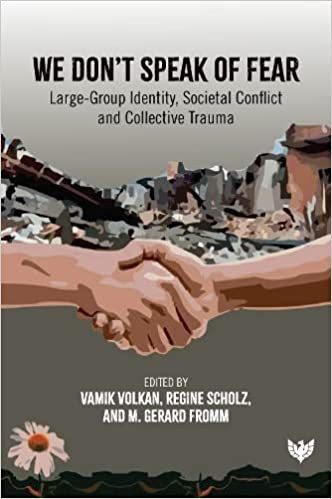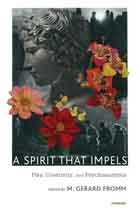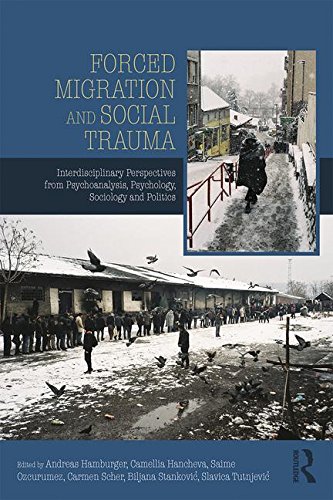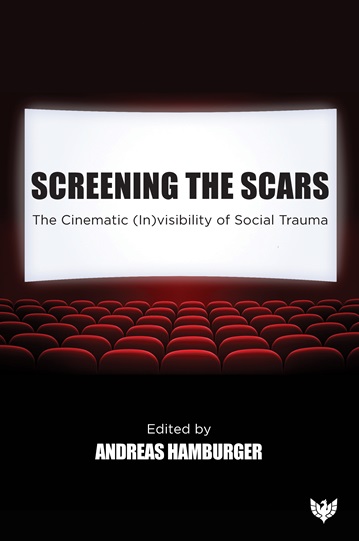Traveling through Time: How Trauma Plays Itself out in Families, Organizations and Society
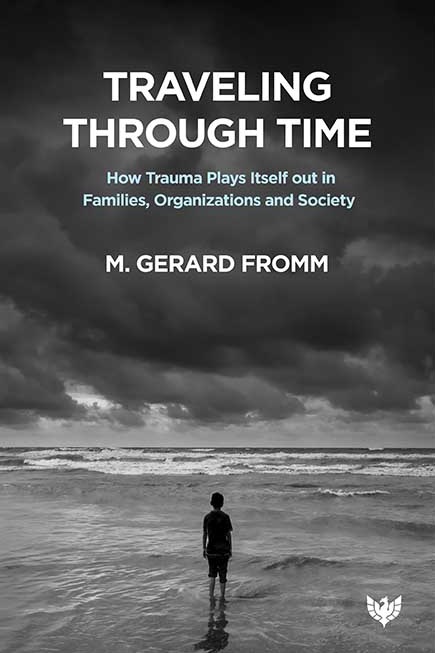
Book Details
- Publisher : Karnac Books
- Published : February 2022
- Cover : Paperback
- Pages : 240
- Category :
Psychoanalysis - Catalogue No : 96103
- ISBN 13 : 9781800130258
- ISBN 10 : 9781800130
Also by M. Gerard Fromm
There are currently no reviews
Be the first to review
“Bullets don’t just travel through skin and bone. They travel through time.”
These words were tattooed onto the shoulder of a young woman whose father was shot during “The Troubles” in Northern Ireland. This wrenching, volatile but also binding truth is the subject of this book. It’s a truth about traumatic experiences that happen to a family, but also to a society, and to the organizations that link these intimate units with the larger context of history and culture. It’s also a truth about the way trauma plays out over time, including between generations.
Grounded in Erik Erikson’s “way of looking at things”, the book is a journal of encounters between clinical psychoanalysis and other disciplines, and an inquiry into what might be learned there for both. Sometimes that learning has to do with trauma: the way in which what can’t be emotionally contained, thought about or spoken in one part of a system is passed along, with disorganizing, sometimes heartbreaking consequences, to another.
After a reflection on dignity, the book examines intergenerational trauma in families, including Erikson’s. It then illustrates how trauma to organizations slips below the threshold of awareness and yet continues to wear down its members. The final section examines aspects of the larger society, including radicalization, war trauma, the pandemic and cultural healing. What emerges is the sober yet hopeful truth that what people discover by taking their own emotional experiences seriously, though that might markedly differ from what is accepted in the everyday world, is a primary path toward recovery from trauma.
Reviews and Endorsements
Traveling through Time is a vivid, nuanced, integrated portrayal of trauma as it exists across time and across social groups. Based on his deep professional engagement with familial, organizational, and societal trauma, Fromm brings to life the experience of the individual in each of those contexts. His psychoanalytic approach emphasizes the dignity of the individual and demonstrates the value of curiosity to understanding such important matters as moral injury and the fear of repetition of trauma, whether conscious or unconscious. He shows us that mourning is required to move beyond grievance to grief, to join past to present, and to create space for an adaptive future. This is a sophisticated book written in accessible language. It is a must read for anyone living or working with trauma.
Harriet Wolfe, M.D., President, International Psychoanalytical Association
What happens to us in the face of unbearable pain? How do our efforts to manage traumatic experience shape our family life, our children’s capacities, our institutions, our society’s development? In this moving book, Dr. Fromm, a master clinician, takes us through these questions with powerfully evocative stories from his long career. He brings our psychological theories to life, illuminating for the general and professional reader aspects of human development that echo across the generations. A stunning collection.
Edward R. Shapiro, M.D., Former Medical Director/CEO, Austen Riggs Center; Clinical Professor of Psychiatry, Yale Child Study Center; author, Finding a Place to Stand: Developing Self-Reflective Institutions, Leaders, and Citizens
This eloquent book examines trauma as it moves through time and takes shape in an “unconscious task deposited into the future,” an unacknowledged history or untold story passed on and enacted in families, in organizations, and in society. Fromm compellingly recounts the stories of children delegated to bring their parents’ unspoken pasts into the present, of organizations whose fragmentation unconsciously communicates a censored history, and of societal structures bound up with what the social or the political realm has not yet assimilated. At the center of this remarkable book is Fromm’s own delicate, subtle act of listening, grounded in his clinical experience and turned not only toward the patients and institutions he encounters but also toward the great psychoanalytic theoreticians, whose work, as he reveals, emerges as a unique task of personal witness. In its movement between individuals and institutions, this book is consistently surprising. And it reminds us, importantly, that the reenactment of trauma demands “the dignity of our listening,” and that the contact with the dead, as Fromm so beautifully shows us, brings life back to the living.
Cathy Caruth, Class of 1916 Professor of English, Cornell University; author, Unclaimed Experience: Trauma, Narrative and History and Listening to Trauma: Conversations with Leaders in the Theory and Treatment of Catastrophic Experience
The true-life stories brought together in this volume really open up the experience of working with traumatized people and communities. But that does not begin to describe its value. This is a book you will come back to again and again. Every few pages you will find a valuable insight or memorable remark. The personal stories of psychoanalytic greats such as Erikson, Bion, and Kohut are fascinating. They shed a new light on the characters and inspired me to return to reading them again. The way the pathology of individuals, families, and communities is woven together is also of great interest. I found myself inspired by the work of Fromm and his colleagues at the Austen Riggs Center’s Erikson Institute. You will be too.
Olivia Brown, Therapy Today
Epilogue, “Anna Freud’s drapes”, provides a “book-end” for this work. Yet I doubt that, for any reader, the influence of the book will end there. We all have our own work to do across families, organisations, and communities. This ending is a touching tale of the scavenging of Anna Freud’s curtains from being cast into a builder’s skip in London, their transformation, neglected, into the author’s back office, and then with a good wife’s creative genius, into gifted cushion covers, marking a psychoanalytic bequest, down generations. This provides a rich and wry tale of a bequest that is also this book’s gift to bestow. As so often the author resorts to the poetic to describe the ineffable and transcendent meanings of such psychoanalytic engagement, for whatever will be the next stage of our various journeys.
Richard Morgan-Jones
Fromm demonstrates an ingenious way of listening and of understanding which is one of the great inspirations of the book. He also has a special way of writing. It is eloquent – at times poetic – and a very personal way of writing. This is worth underlining as it brings the reader into the material, and the experiences described are often very difficult to take in and to reflect upon. It took this reviewer a long time to read the book. This was, however, necessary as the book presents the worst of humankind’s history. But Fromm also offers ways to deal with trauma and also hope. Fromm has a way of leading the reader gently but firmly into matters that we will need to deal with in years to come.
Sverre Varvin, International Journal of Psychoanalysis, 2023, (104)(6):1136-1139
An ethos of insightful caring pervades this book. [...] Most of the chapters in this book are reworkings of previously published writings that have been assembled in such a way that they effectively complement each other.
John Rosegrant, Psychoanalytic Psychology, American Psychological Association 2023, Vol. 40, No. 2, 141–142
Table of Contents
Acknowledgments
Permissions
About the author
Introduction – Travelling through Time
Prologue - Of Whom Shall We Speak: Psychoanalysis and Dignity
Part I: Trauma in Families
Chapter 1 – Fear of Breakthrough: The Transmission of Trauma
Chapter 2 – Walking into the Wild: Traumatic Disillusionment and Identity Crisis
Chapter 3 – A Way of Looking at Trauma: Erik Erikson and the “Cogwheeling” of Life Cycles
Part II: Trauma in Organizations
Chapter 4 – Minding the Gap: The Problem of College Suicide
Chapter 5 – Potential Space and Organizational Trauma
Chapter 6 – On the Mantelpiece: Organizational Trauma in Plain Sight
Part III: Trauma in Society
Chapter 7 – National Nightmare: The Legacy of Perpetrator Trauma
Chapter 8 – The Cure for Depression is Jihad: A Case Study
Chapter 9 – Sky of Tears: Clinical Work after 9/11
Chapter 10 – The Day I Died: Combat Trauma and Moral Injury
Chapter 11 – We Don’t Speak of Fear: Large Group Identity and Chosen Trauma
Chapter 12 – The Stones Speak: Historical Trauma and Cultural Healing
Chapter 13 – Traveling through Time: A Group Intervention in Northern Ireland
Afterword – When There Are So Many: Two Moments during the Pandemic
Epilogue – Anna Freud’s Drapes
References
Index
About the Author(s)
M. Gerard Fromm, PhD, directed the Erikson Institute for Education and Research at the Austen Riggs Center for many years, where he is currently Senior Consultant. He teaches at a number of psychoanalytic institutes and is on the faculties of Harvard Medical School and the Yale Child Study Center. He is the editor of The Facilitating Environment: Clinical Applications of Winnicott’s Theory (with Bruce L. Smith, PhD) and Lost in Transmission: Studies of Trauma across the Generations. His most recent book, Taking the Transference, Reaching toward Dreams, reports on his clinical work at the Center.
Customer Reviews
Our customers have not yet reviewed this title. Be the first add your own review for this title.
You may also like
Forced Migration and Social Trauma: Interdisciplinary Perspectives from...
Andreas Hamburger
Price £36.99
We Don't Speak of Fear: Large-Group Identity, Societal Conflict and Collective...
Vamik D. Volkan
Price £27.89
save £3.10
Screening the Scars: The Cinematic (In)visibility of Social Trauma
Andreas Hamburger
Price £26.09
save £2.90


